Principles and Practice of Marketing
VerifiedAdded on 2023/04/22
|13
|4402
|466
AI Summary
Contribute Materials
Your contribution can guide someone’s learning journey. Share your
documents today.
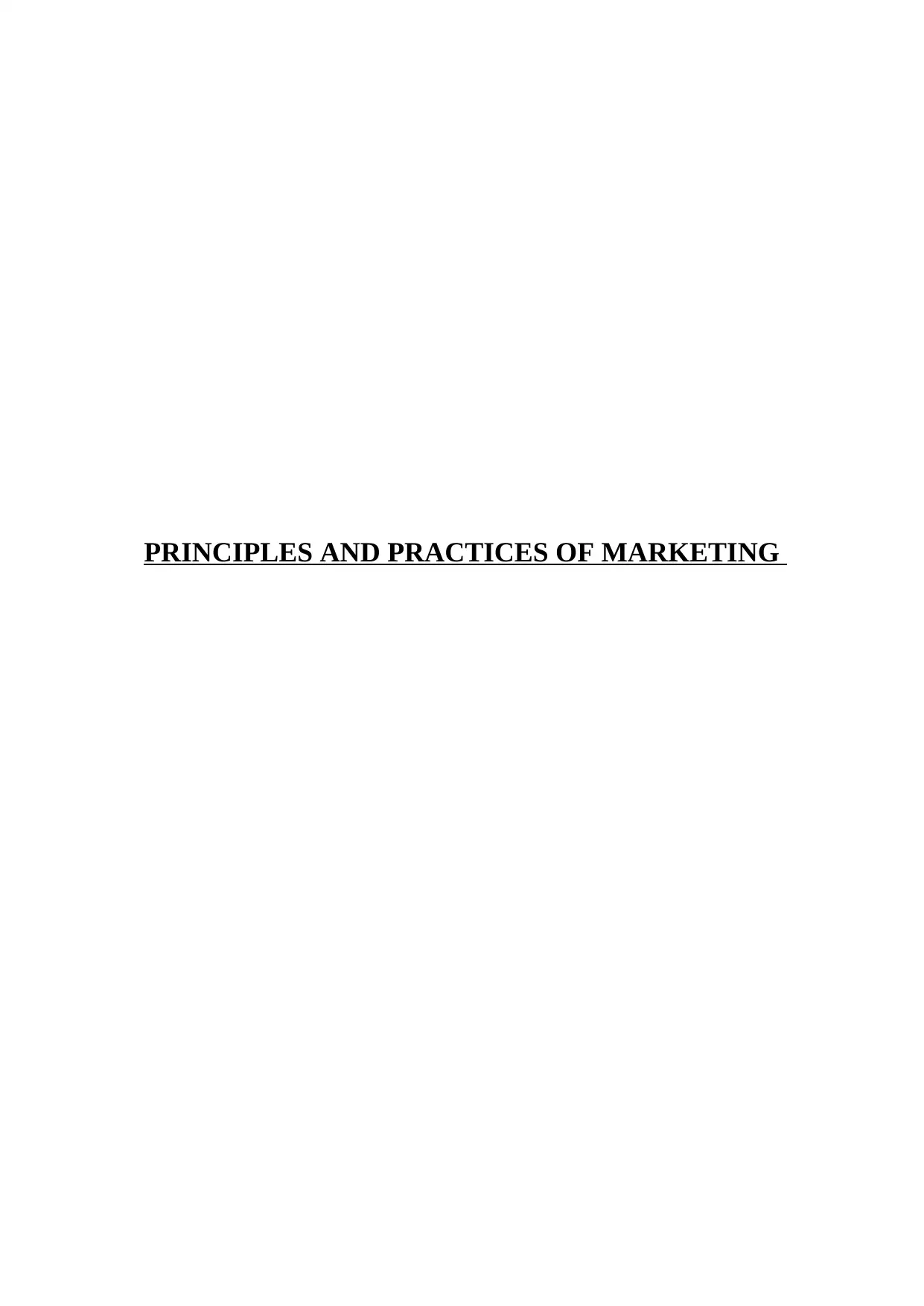
PRINCIPLES AND PRACTICES OF MARKETING
Secure Best Marks with AI Grader
Need help grading? Try our AI Grader for instant feedback on your assignments.
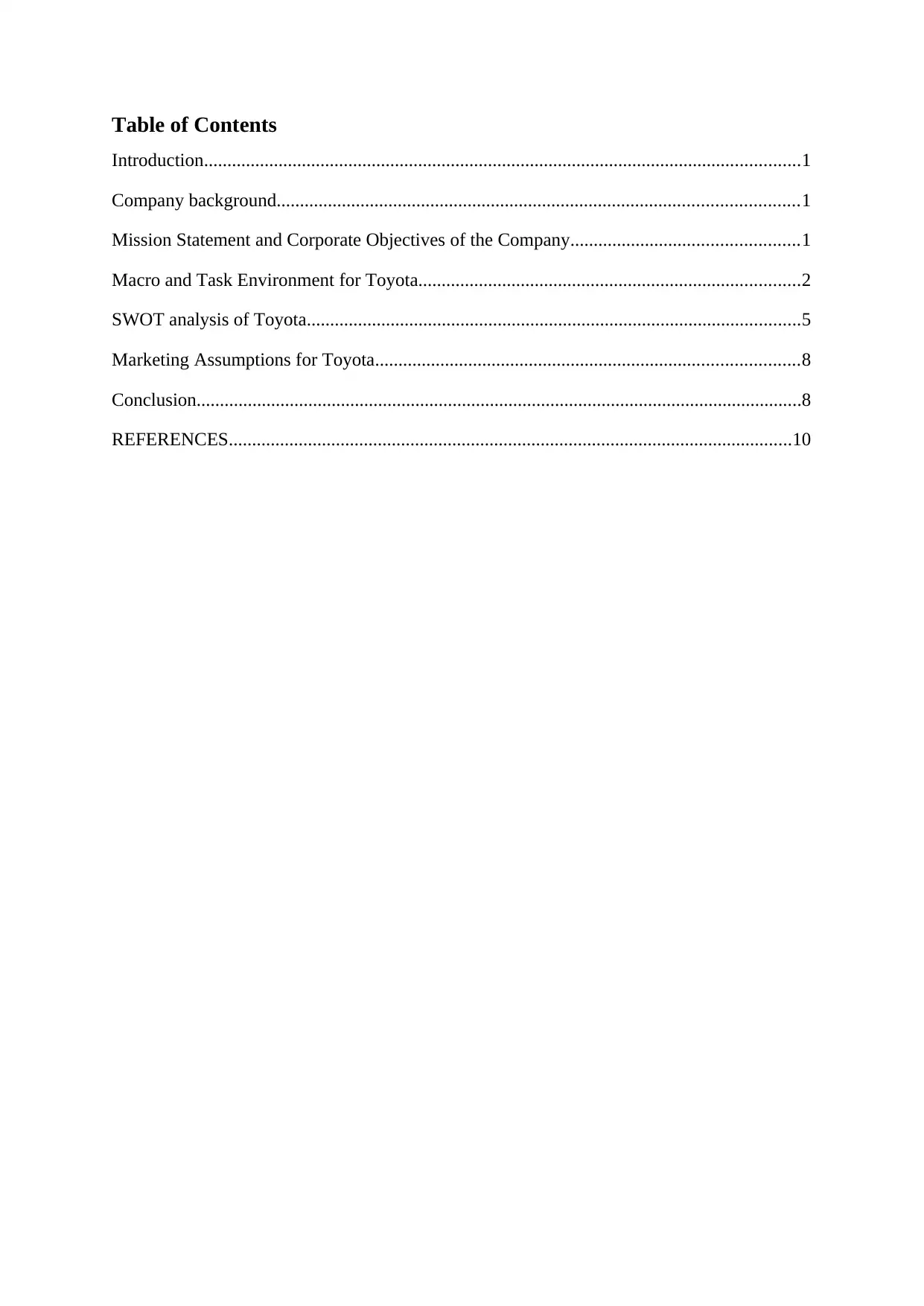
Table of Contents
Introduction................................................................................................................................1
Company background................................................................................................................1
Mission Statement and Corporate Objectives of the Company.................................................1
Macro and Task Environment for Toyota..................................................................................2
SWOT analysis of Toyota..........................................................................................................5
Marketing Assumptions for Toyota...........................................................................................8
Conclusion..................................................................................................................................8
REFERENCES.........................................................................................................................10
Introduction................................................................................................................................1
Company background................................................................................................................1
Mission Statement and Corporate Objectives of the Company.................................................1
Macro and Task Environment for Toyota..................................................................................2
SWOT analysis of Toyota..........................................................................................................5
Marketing Assumptions for Toyota...........................................................................................8
Conclusion..................................................................................................................................8
REFERENCES.........................................................................................................................10
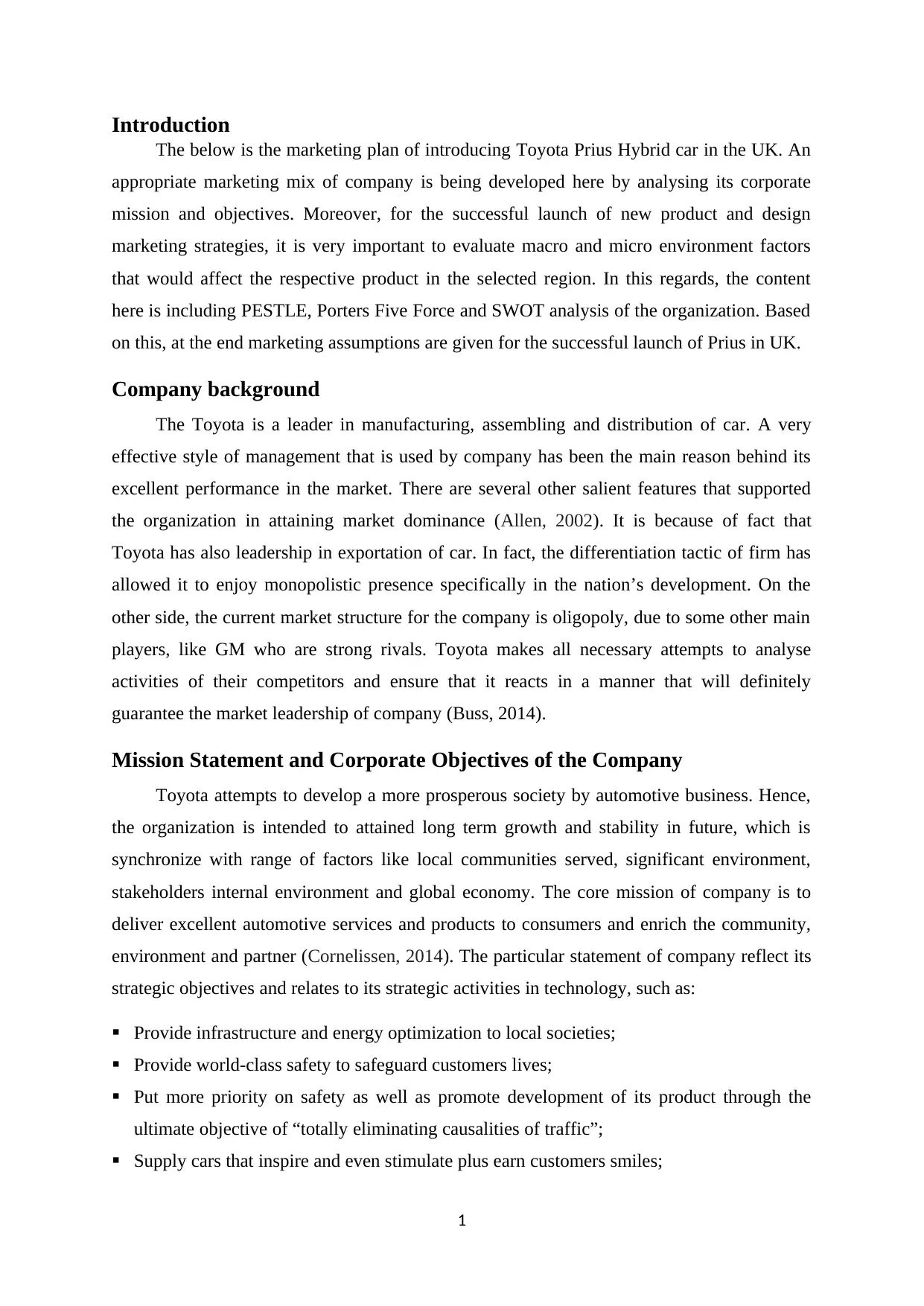
Introduction
The below is the marketing plan of introducing Toyota Prius Hybrid car in the UK. An
appropriate marketing mix of company is being developed here by analysing its corporate
mission and objectives. Moreover, for the successful launch of new product and design
marketing strategies, it is very important to evaluate macro and micro environment factors
that would affect the respective product in the selected region. In this regards, the content
here is including PESTLE, Porters Five Force and SWOT analysis of the organization. Based
on this, at the end marketing assumptions are given for the successful launch of Prius in UK.
Company background
The Toyota is a leader in manufacturing, assembling and distribution of car. A very
effective style of management that is used by company has been the main reason behind its
excellent performance in the market. There are several other salient features that supported
the organization in attaining market dominance (Allen, 2002). It is because of fact that
Toyota has also leadership in exportation of car. In fact, the differentiation tactic of firm has
allowed it to enjoy monopolistic presence specifically in the nation’s development. On the
other side, the current market structure for the company is oligopoly, due to some other main
players, like GM who are strong rivals. Toyota makes all necessary attempts to analyse
activities of their competitors and ensure that it reacts in a manner that will definitely
guarantee the market leadership of company (Buss, 2014).
Mission Statement and Corporate Objectives of the Company
Toyota attempts to develop a more prosperous society by automotive business. Hence,
the organization is intended to attained long term growth and stability in future, which is
synchronize with range of factors like local communities served, significant environment,
stakeholders internal environment and global economy. The core mission of company is to
deliver excellent automotive services and products to consumers and enrich the community,
environment and partner (Cornelissen, 2014). The particular statement of company reflect its
strategic objectives and relates to its strategic activities in technology, such as:
Provide infrastructure and energy optimization to local societies;
Provide world-class safety to safeguard customers lives;
Put more priority on safety as well as promote development of its product through the
ultimate objective of “totally eliminating causalities of traffic”;
Supply cars that inspire and even stimulate plus earn customers smiles;
1
The below is the marketing plan of introducing Toyota Prius Hybrid car in the UK. An
appropriate marketing mix of company is being developed here by analysing its corporate
mission and objectives. Moreover, for the successful launch of new product and design
marketing strategies, it is very important to evaluate macro and micro environment factors
that would affect the respective product in the selected region. In this regards, the content
here is including PESTLE, Porters Five Force and SWOT analysis of the organization. Based
on this, at the end marketing assumptions are given for the successful launch of Prius in UK.
Company background
The Toyota is a leader in manufacturing, assembling and distribution of car. A very
effective style of management that is used by company has been the main reason behind its
excellent performance in the market. There are several other salient features that supported
the organization in attaining market dominance (Allen, 2002). It is because of fact that
Toyota has also leadership in exportation of car. In fact, the differentiation tactic of firm has
allowed it to enjoy monopolistic presence specifically in the nation’s development. On the
other side, the current market structure for the company is oligopoly, due to some other main
players, like GM who are strong rivals. Toyota makes all necessary attempts to analyse
activities of their competitors and ensure that it reacts in a manner that will definitely
guarantee the market leadership of company (Buss, 2014).
Mission Statement and Corporate Objectives of the Company
Toyota attempts to develop a more prosperous society by automotive business. Hence,
the organization is intended to attained long term growth and stability in future, which is
synchronize with range of factors like local communities served, significant environment,
stakeholders internal environment and global economy. The core mission of company is to
deliver excellent automotive services and products to consumers and enrich the community,
environment and partner (Cornelissen, 2014). The particular statement of company reflect its
strategic objectives and relates to its strategic activities in technology, such as:
Provide infrastructure and energy optimization to local societies;
Provide world-class safety to safeguard customers lives;
Put more priority on safety as well as promote development of its product through the
ultimate objective of “totally eliminating causalities of traffic”;
Supply cars that inspire and even stimulate plus earn customers smiles;
1
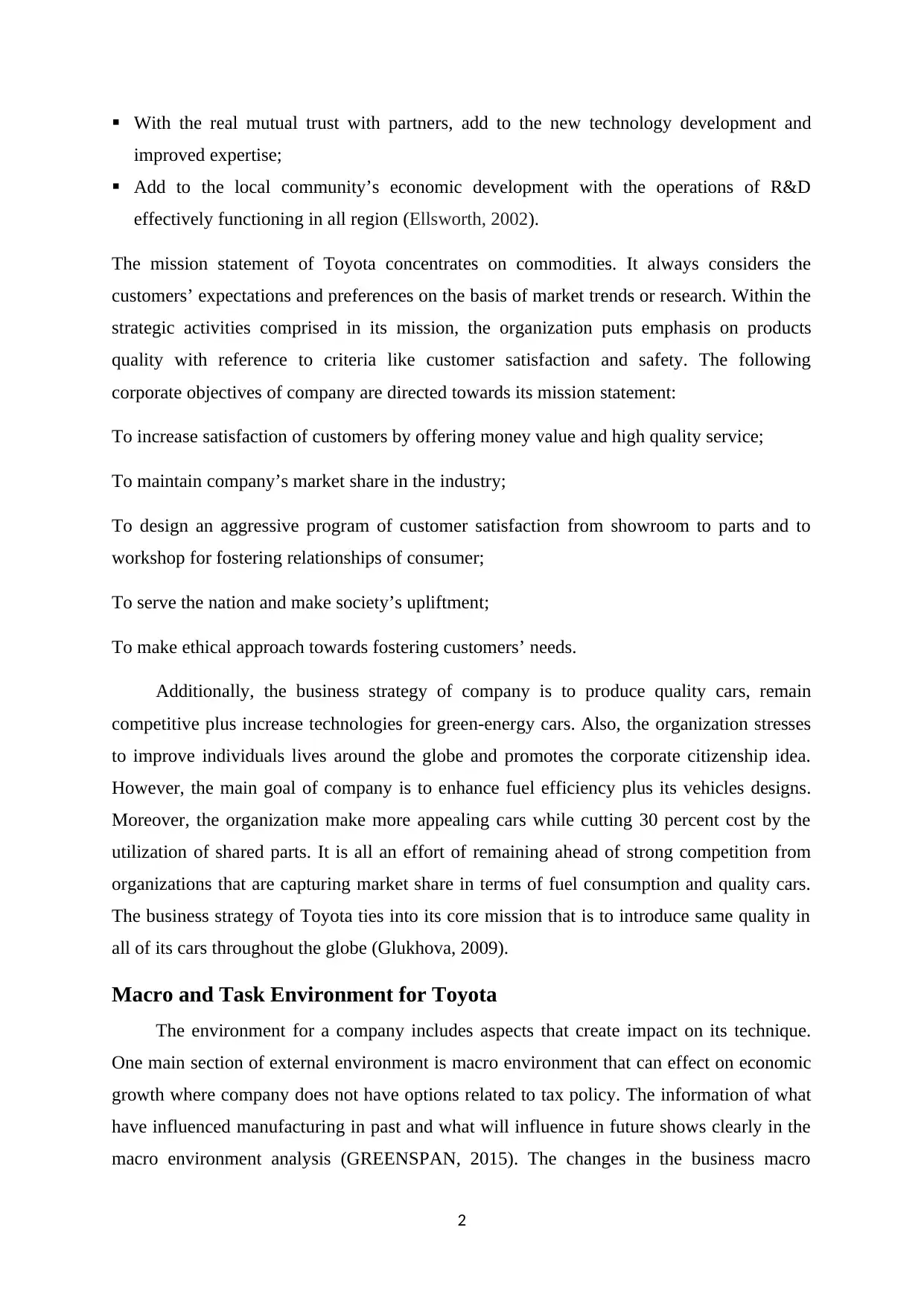
With the real mutual trust with partners, add to the new technology development and
improved expertise;
Add to the local community’s economic development with the operations of R&D
effectively functioning in all region (Ellsworth, 2002).
The mission statement of Toyota concentrates on commodities. It always considers the
customers’ expectations and preferences on the basis of market trends or research. Within the
strategic activities comprised in its mission, the organization puts emphasis on products
quality with reference to criteria like customer satisfaction and safety. The following
corporate objectives of company are directed towards its mission statement:
To increase satisfaction of customers by offering money value and high quality service;
To maintain company’s market share in the industry;
To design an aggressive program of customer satisfaction from showroom to parts and to
workshop for fostering relationships of consumer;
To serve the nation and make society’s upliftment;
To make ethical approach towards fostering customers’ needs.
Additionally, the business strategy of company is to produce quality cars, remain
competitive plus increase technologies for green-energy cars. Also, the organization stresses
to improve individuals lives around the globe and promotes the corporate citizenship idea.
However, the main goal of company is to enhance fuel efficiency plus its vehicles designs.
Moreover, the organization make more appealing cars while cutting 30 percent cost by the
utilization of shared parts. It is all an effort of remaining ahead of strong competition from
organizations that are capturing market share in terms of fuel consumption and quality cars.
The business strategy of Toyota ties into its core mission that is to introduce same quality in
all of its cars throughout the globe (Glukhova, 2009).
Macro and Task Environment for Toyota
The environment for a company includes aspects that create impact on its technique.
One main section of external environment is macro environment that can effect on economic
growth where company does not have options related to tax policy. The information of what
have influenced manufacturing in past and what will influence in future shows clearly in the
macro environment analysis (GREENSPAN, 2015). The changes in the business macro
2
improved expertise;
Add to the local community’s economic development with the operations of R&D
effectively functioning in all region (Ellsworth, 2002).
The mission statement of Toyota concentrates on commodities. It always considers the
customers’ expectations and preferences on the basis of market trends or research. Within the
strategic activities comprised in its mission, the organization puts emphasis on products
quality with reference to criteria like customer satisfaction and safety. The following
corporate objectives of company are directed towards its mission statement:
To increase satisfaction of customers by offering money value and high quality service;
To maintain company’s market share in the industry;
To design an aggressive program of customer satisfaction from showroom to parts and to
workshop for fostering relationships of consumer;
To serve the nation and make society’s upliftment;
To make ethical approach towards fostering customers’ needs.
Additionally, the business strategy of company is to produce quality cars, remain
competitive plus increase technologies for green-energy cars. Also, the organization stresses
to improve individuals lives around the globe and promotes the corporate citizenship idea.
However, the main goal of company is to enhance fuel efficiency plus its vehicles designs.
Moreover, the organization make more appealing cars while cutting 30 percent cost by the
utilization of shared parts. It is all an effort of remaining ahead of strong competition from
organizations that are capturing market share in terms of fuel consumption and quality cars.
The business strategy of Toyota ties into its core mission that is to introduce same quality in
all of its cars throughout the globe (Glukhova, 2009).
Macro and Task Environment for Toyota
The environment for a company includes aspects that create impact on its technique.
One main section of external environment is macro environment that can effect on economic
growth where company does not have options related to tax policy. The information of what
have influenced manufacturing in past and what will influence in future shows clearly in the
macro environment analysis (GREENSPAN, 2015). The changes in the business macro
2
Secure Best Marks with AI Grader
Need help grading? Try our AI Grader for instant feedback on your assignments.
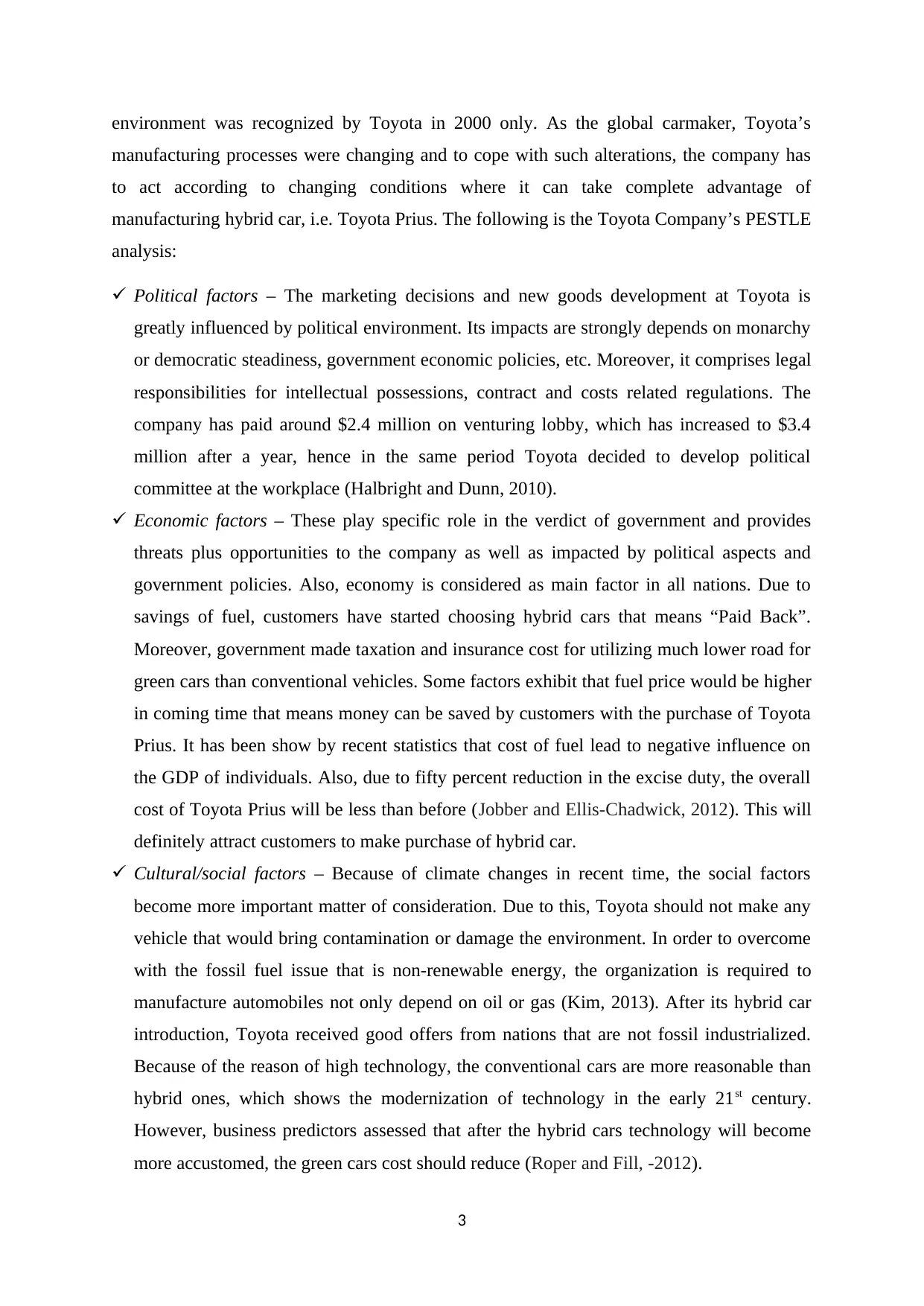
environment was recognized by Toyota in 2000 only. As the global carmaker, Toyota’s
manufacturing processes were changing and to cope with such alterations, the company has
to act according to changing conditions where it can take complete advantage of
manufacturing hybrid car, i.e. Toyota Prius. The following is the Toyota Company’s PESTLE
analysis:
Political factors – The marketing decisions and new goods development at Toyota is
greatly influenced by political environment. Its impacts are strongly depends on monarchy
or democratic steadiness, government economic policies, etc. Moreover, it comprises legal
responsibilities for intellectual possessions, contract and costs related regulations. The
company has paid around $2.4 million on venturing lobby, which has increased to $3.4
million after a year, hence in the same period Toyota decided to develop political
committee at the workplace (Halbright and Dunn, 2010).
Economic factors – These play specific role in the verdict of government and provides
threats plus opportunities to the company as well as impacted by political aspects and
government policies. Also, economy is considered as main factor in all nations. Due to
savings of fuel, customers have started choosing hybrid cars that means “Paid Back”.
Moreover, government made taxation and insurance cost for utilizing much lower road for
green cars than conventional vehicles. Some factors exhibit that fuel price would be higher
in coming time that means money can be saved by customers with the purchase of Toyota
Prius. It has been show by recent statistics that cost of fuel lead to negative influence on
the GDP of individuals. Also, due to fifty percent reduction in the excise duty, the overall
cost of Toyota Prius will be less than before (Jobber and Ellis-Chadwick, 2012). This will
definitely attract customers to make purchase of hybrid car.
Cultural/social factors – Because of climate changes in recent time, the social factors
become more important matter of consideration. Due to this, Toyota should not make any
vehicle that would bring contamination or damage the environment. In order to overcome
with the fossil fuel issue that is non-renewable energy, the organization is required to
manufacture automobiles not only depend on oil or gas (Kim, 2013). After its hybrid car
introduction, Toyota received good offers from nations that are not fossil industrialized.
Because of the reason of high technology, the conventional cars are more reasonable than
hybrid ones, which shows the modernization of technology in the early 21st century.
However, business predictors assessed that after the hybrid cars technology will become
more accustomed, the green cars cost should reduce (Roper and Fill, -2012).
3
manufacturing processes were changing and to cope with such alterations, the company has
to act according to changing conditions where it can take complete advantage of
manufacturing hybrid car, i.e. Toyota Prius. The following is the Toyota Company’s PESTLE
analysis:
Political factors – The marketing decisions and new goods development at Toyota is
greatly influenced by political environment. Its impacts are strongly depends on monarchy
or democratic steadiness, government economic policies, etc. Moreover, it comprises legal
responsibilities for intellectual possessions, contract and costs related regulations. The
company has paid around $2.4 million on venturing lobby, which has increased to $3.4
million after a year, hence in the same period Toyota decided to develop political
committee at the workplace (Halbright and Dunn, 2010).
Economic factors – These play specific role in the verdict of government and provides
threats plus opportunities to the company as well as impacted by political aspects and
government policies. Also, economy is considered as main factor in all nations. Due to
savings of fuel, customers have started choosing hybrid cars that means “Paid Back”.
Moreover, government made taxation and insurance cost for utilizing much lower road for
green cars than conventional vehicles. Some factors exhibit that fuel price would be higher
in coming time that means money can be saved by customers with the purchase of Toyota
Prius. It has been show by recent statistics that cost of fuel lead to negative influence on
the GDP of individuals. Also, due to fifty percent reduction in the excise duty, the overall
cost of Toyota Prius will be less than before (Jobber and Ellis-Chadwick, 2012). This will
definitely attract customers to make purchase of hybrid car.
Cultural/social factors – Because of climate changes in recent time, the social factors
become more important matter of consideration. Due to this, Toyota should not make any
vehicle that would bring contamination or damage the environment. In order to overcome
with the fossil fuel issue that is non-renewable energy, the organization is required to
manufacture automobiles not only depend on oil or gas (Kim, 2013). After its hybrid car
introduction, Toyota received good offers from nations that are not fossil industrialized.
Because of the reason of high technology, the conventional cars are more reasonable than
hybrid ones, which shows the modernization of technology in the early 21st century.
However, business predictors assessed that after the hybrid cars technology will become
more accustomed, the green cars cost should reduce (Roper and Fill, -2012).
3
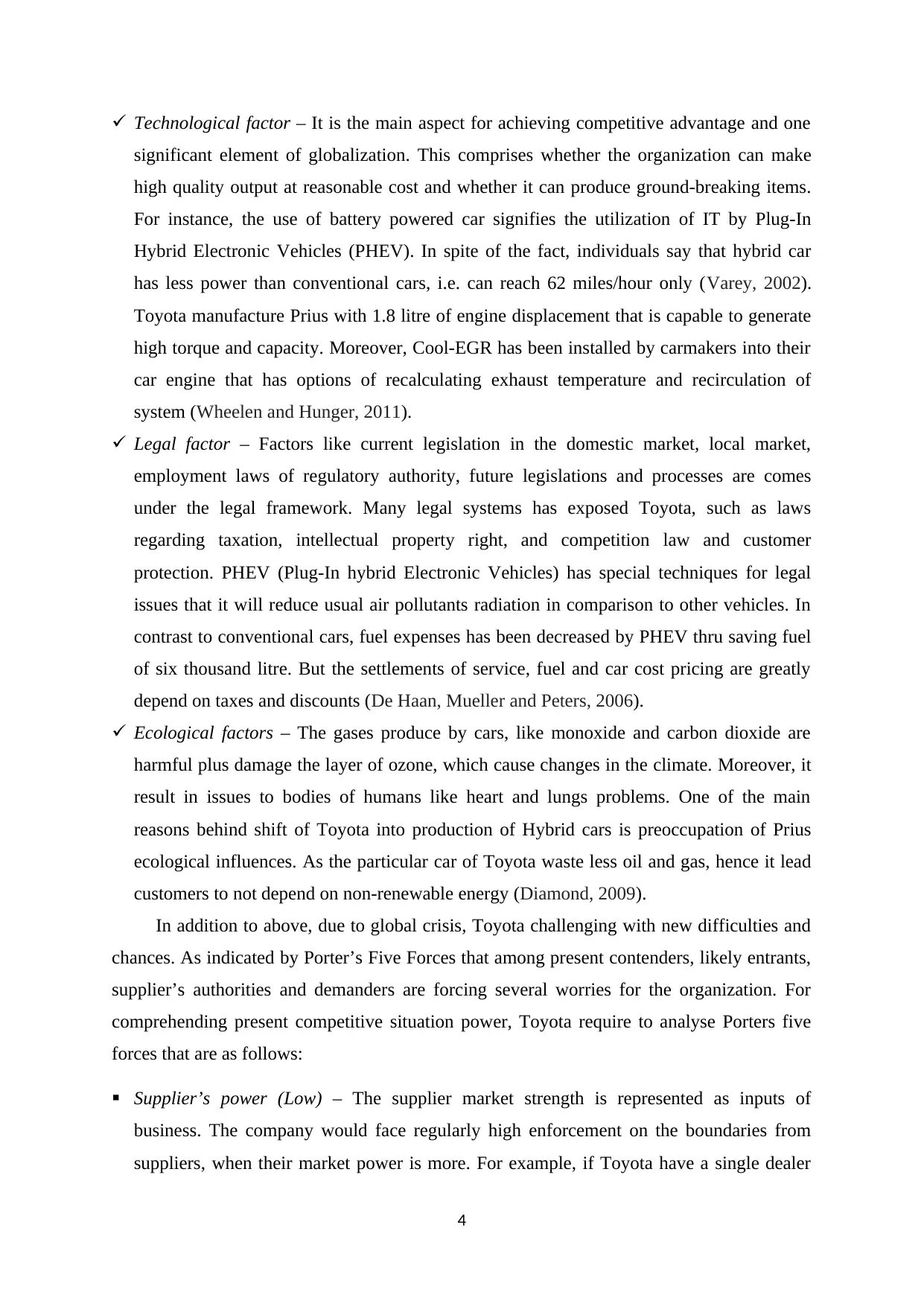
Technological factor – It is the main aspect for achieving competitive advantage and one
significant element of globalization. This comprises whether the organization can make
high quality output at reasonable cost and whether it can produce ground-breaking items.
For instance, the use of battery powered car signifies the utilization of IT by Plug-In
Hybrid Electronic Vehicles (PHEV). In spite of the fact, individuals say that hybrid car
has less power than conventional cars, i.e. can reach 62 miles/hour only (Varey, 2002).
Toyota manufacture Prius with 1.8 litre of engine displacement that is capable to generate
high torque and capacity. Moreover, Cool-EGR has been installed by carmakers into their
car engine that has options of recalculating exhaust temperature and recirculation of
system (Wheelen and Hunger, 2011).
Legal factor – Factors like current legislation in the domestic market, local market,
employment laws of regulatory authority, future legislations and processes are comes
under the legal framework. Many legal systems has exposed Toyota, such as laws
regarding taxation, intellectual property right, and competition law and customer
protection. PHEV (Plug-In hybrid Electronic Vehicles) has special techniques for legal
issues that it will reduce usual air pollutants radiation in comparison to other vehicles. In
contrast to conventional cars, fuel expenses has been decreased by PHEV thru saving fuel
of six thousand litre. But the settlements of service, fuel and car cost pricing are greatly
depend on taxes and discounts (De Haan, Mueller and Peters, 2006).
Ecological factors – The gases produce by cars, like monoxide and carbon dioxide are
harmful plus damage the layer of ozone, which cause changes in the climate. Moreover, it
result in issues to bodies of humans like heart and lungs problems. One of the main
reasons behind shift of Toyota into production of Hybrid cars is preoccupation of Prius
ecological influences. As the particular car of Toyota waste less oil and gas, hence it lead
customers to not depend on non-renewable energy (Diamond, 2009).
In addition to above, due to global crisis, Toyota challenging with new difficulties and
chances. As indicated by Porter’s Five Forces that among present contenders, likely entrants,
supplier’s authorities and demanders are forcing several worries for the organization. For
comprehending present competitive situation power, Toyota require to analyse Porters five
forces that are as follows:
Supplier’s power (Low) – The supplier market strength is represented as inputs of
business. The company would face regularly high enforcement on the boundaries from
suppliers, when their market power is more. For example, if Toyota have a single dealer
4
significant element of globalization. This comprises whether the organization can make
high quality output at reasonable cost and whether it can produce ground-breaking items.
For instance, the use of battery powered car signifies the utilization of IT by Plug-In
Hybrid Electronic Vehicles (PHEV). In spite of the fact, individuals say that hybrid car
has less power than conventional cars, i.e. can reach 62 miles/hour only (Varey, 2002).
Toyota manufacture Prius with 1.8 litre of engine displacement that is capable to generate
high torque and capacity. Moreover, Cool-EGR has been installed by carmakers into their
car engine that has options of recalculating exhaust temperature and recirculation of
system (Wheelen and Hunger, 2011).
Legal factor – Factors like current legislation in the domestic market, local market,
employment laws of regulatory authority, future legislations and processes are comes
under the legal framework. Many legal systems has exposed Toyota, such as laws
regarding taxation, intellectual property right, and competition law and customer
protection. PHEV (Plug-In hybrid Electronic Vehicles) has special techniques for legal
issues that it will reduce usual air pollutants radiation in comparison to other vehicles. In
contrast to conventional cars, fuel expenses has been decreased by PHEV thru saving fuel
of six thousand litre. But the settlements of service, fuel and car cost pricing are greatly
depend on taxes and discounts (De Haan, Mueller and Peters, 2006).
Ecological factors – The gases produce by cars, like monoxide and carbon dioxide are
harmful plus damage the layer of ozone, which cause changes in the climate. Moreover, it
result in issues to bodies of humans like heart and lungs problems. One of the main
reasons behind shift of Toyota into production of Hybrid cars is preoccupation of Prius
ecological influences. As the particular car of Toyota waste less oil and gas, hence it lead
customers to not depend on non-renewable energy (Diamond, 2009).
In addition to above, due to global crisis, Toyota challenging with new difficulties and
chances. As indicated by Porter’s Five Forces that among present contenders, likely entrants,
supplier’s authorities and demanders are forcing several worries for the organization. For
comprehending present competitive situation power, Toyota require to analyse Porters five
forces that are as follows:
Supplier’s power (Low) – The supplier market strength is represented as inputs of
business. The company would face regularly high enforcement on the boundaries from
suppliers, when their market power is more. For example, if Toyota have a single dealer
4
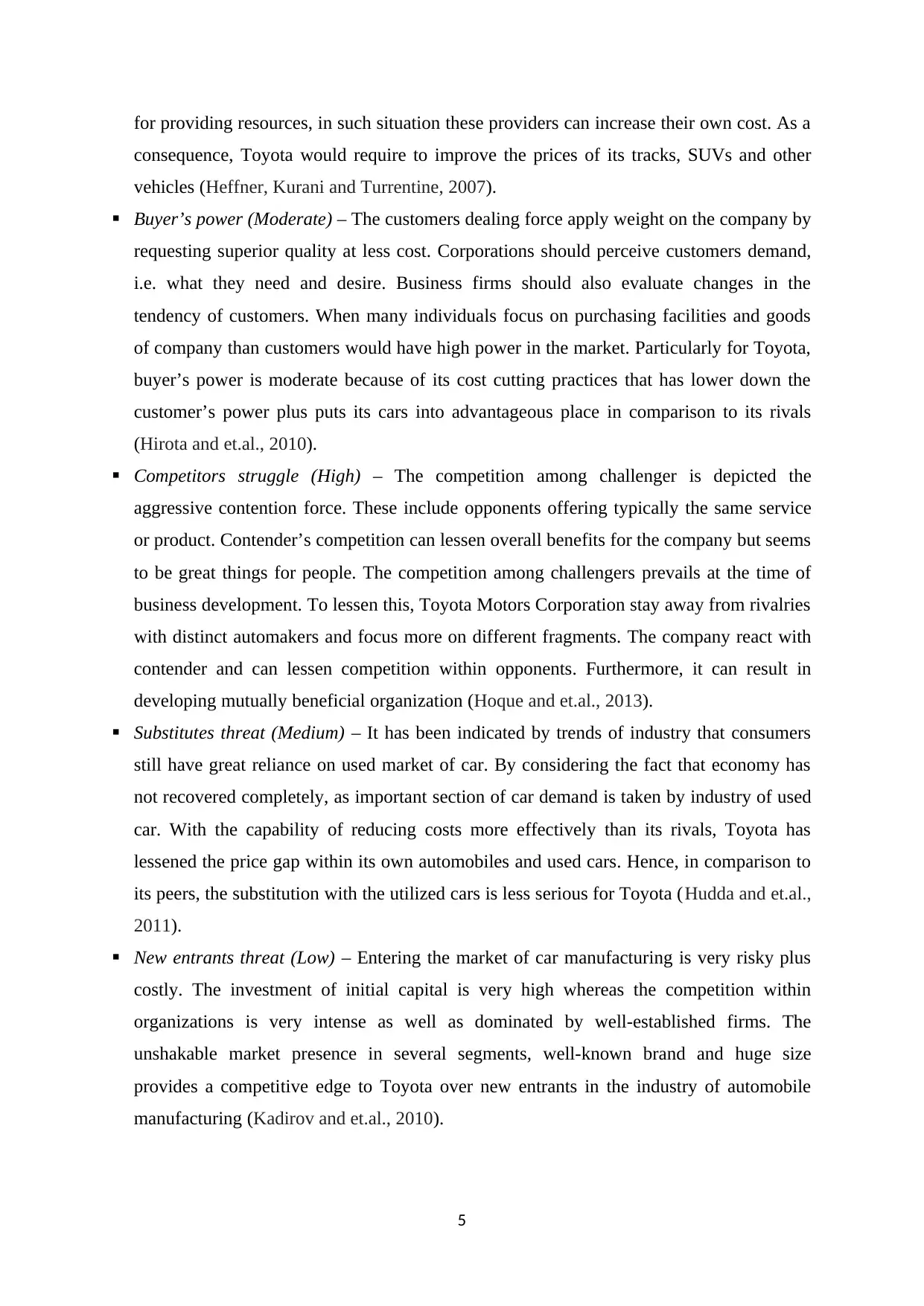
for providing resources, in such situation these providers can increase their own cost. As a
consequence, Toyota would require to improve the prices of its tracks, SUVs and other
vehicles (Heffner, Kurani and Turrentine, 2007).
Buyer’s power (Moderate) – The customers dealing force apply weight on the company by
requesting superior quality at less cost. Corporations should perceive customers demand,
i.e. what they need and desire. Business firms should also evaluate changes in the
tendency of customers. When many individuals focus on purchasing facilities and goods
of company than customers would have high power in the market. Particularly for Toyota,
buyer’s power is moderate because of its cost cutting practices that has lower down the
customer’s power plus puts its cars into advantageous place in comparison to its rivals
(Hirota and et.al., 2010).
Competitors struggle (High) – The competition among challenger is depicted the
aggressive contention force. These include opponents offering typically the same service
or product. Contender’s competition can lessen overall benefits for the company but seems
to be great things for people. The competition among challengers prevails at the time of
business development. To lessen this, Toyota Motors Corporation stay away from rivalries
with distinct automakers and focus more on different fragments. The company react with
contender and can lessen competition within opponents. Furthermore, it can result in
developing mutually beneficial organization (Hoque and et.al., 2013).
Substitutes threat (Medium) – It has been indicated by trends of industry that consumers
still have great reliance on used market of car. By considering the fact that economy has
not recovered completely, as important section of car demand is taken by industry of used
car. With the capability of reducing costs more effectively than its rivals, Toyota has
lessened the price gap within its own automobiles and used cars. Hence, in comparison to
its peers, the substitution with the utilized cars is less serious for Toyota (Hudda and et.al.,
2011).
New entrants threat (Low) – Entering the market of car manufacturing is very risky plus
costly. The investment of initial capital is very high whereas the competition within
organizations is very intense as well as dominated by well-established firms. The
unshakable market presence in several segments, well-known brand and huge size
provides a competitive edge to Toyota over new entrants in the industry of automobile
manufacturing (Kadirov and et.al., 2010).
5
consequence, Toyota would require to improve the prices of its tracks, SUVs and other
vehicles (Heffner, Kurani and Turrentine, 2007).
Buyer’s power (Moderate) – The customers dealing force apply weight on the company by
requesting superior quality at less cost. Corporations should perceive customers demand,
i.e. what they need and desire. Business firms should also evaluate changes in the
tendency of customers. When many individuals focus on purchasing facilities and goods
of company than customers would have high power in the market. Particularly for Toyota,
buyer’s power is moderate because of its cost cutting practices that has lower down the
customer’s power plus puts its cars into advantageous place in comparison to its rivals
(Hirota and et.al., 2010).
Competitors struggle (High) – The competition among challenger is depicted the
aggressive contention force. These include opponents offering typically the same service
or product. Contender’s competition can lessen overall benefits for the company but seems
to be great things for people. The competition among challengers prevails at the time of
business development. To lessen this, Toyota Motors Corporation stay away from rivalries
with distinct automakers and focus more on different fragments. The company react with
contender and can lessen competition within opponents. Furthermore, it can result in
developing mutually beneficial organization (Hoque and et.al., 2013).
Substitutes threat (Medium) – It has been indicated by trends of industry that consumers
still have great reliance on used market of car. By considering the fact that economy has
not recovered completely, as important section of car demand is taken by industry of used
car. With the capability of reducing costs more effectively than its rivals, Toyota has
lessened the price gap within its own automobiles and used cars. Hence, in comparison to
its peers, the substitution with the utilized cars is less serious for Toyota (Hudda and et.al.,
2011).
New entrants threat (Low) – Entering the market of car manufacturing is very risky plus
costly. The investment of initial capital is very high whereas the competition within
organizations is very intense as well as dominated by well-established firms. The
unshakable market presence in several segments, well-known brand and huge size
provides a competitive edge to Toyota over new entrants in the industry of automobile
manufacturing (Kadirov and et.al., 2010).
5
Paraphrase This Document
Need a fresh take? Get an instant paraphrase of this document with our AI Paraphraser
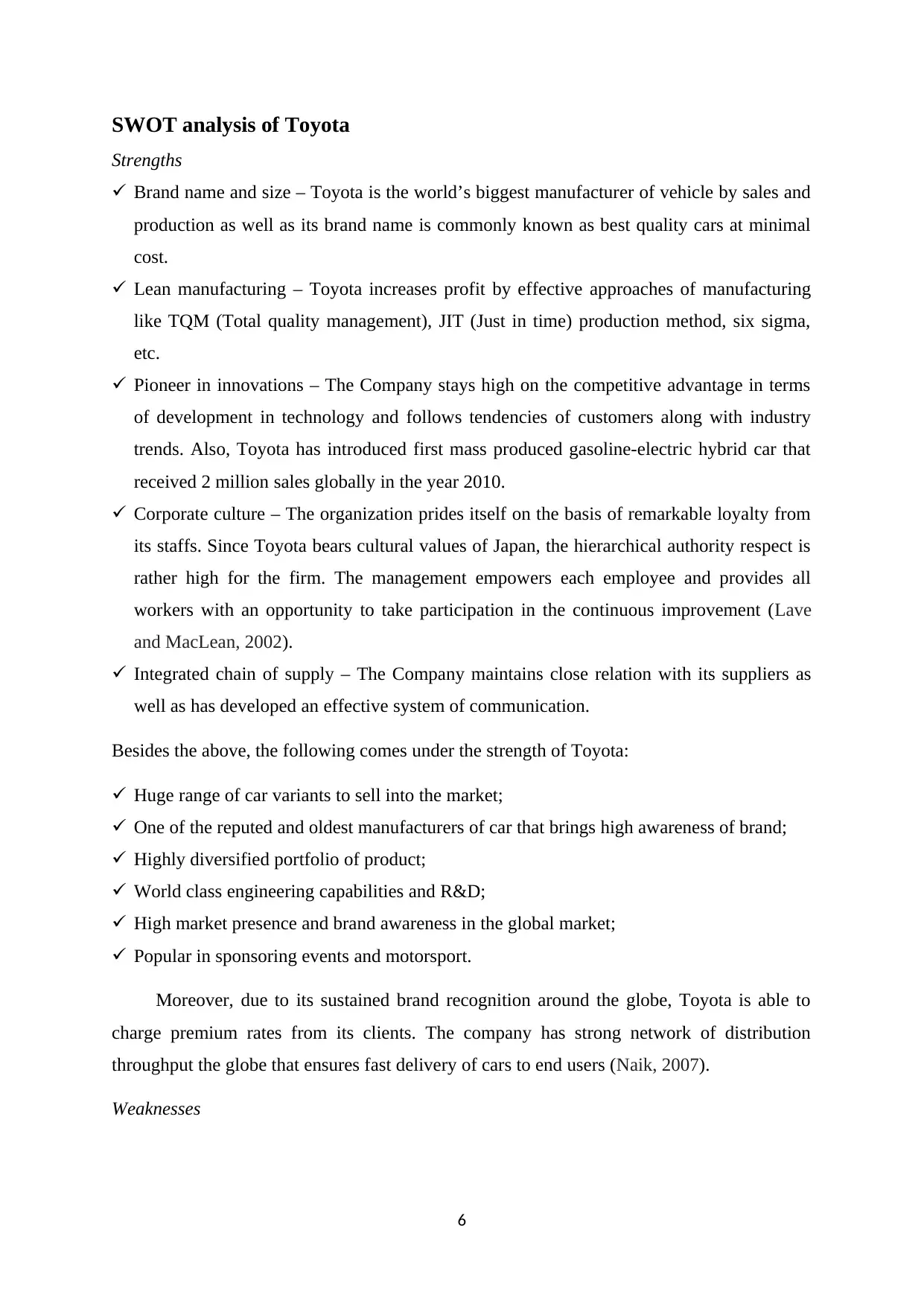
SWOT analysis of Toyota
Strengths
Brand name and size – Toyota is the world’s biggest manufacturer of vehicle by sales and
production as well as its brand name is commonly known as best quality cars at minimal
cost.
Lean manufacturing – Toyota increases profit by effective approaches of manufacturing
like TQM (Total quality management), JIT (Just in time) production method, six sigma,
etc.
Pioneer in innovations – The Company stays high on the competitive advantage in terms
of development in technology and follows tendencies of customers along with industry
trends. Also, Toyota has introduced first mass produced gasoline-electric hybrid car that
received 2 million sales globally in the year 2010.
Corporate culture – The organization prides itself on the basis of remarkable loyalty from
its staffs. Since Toyota bears cultural values of Japan, the hierarchical authority respect is
rather high for the firm. The management empowers each employee and provides all
workers with an opportunity to take participation in the continuous improvement (Lave
and MacLean, 2002).
Integrated chain of supply – The Company maintains close relation with its suppliers as
well as has developed an effective system of communication.
Besides the above, the following comes under the strength of Toyota:
Huge range of car variants to sell into the market;
One of the reputed and oldest manufacturers of car that brings high awareness of brand;
Highly diversified portfolio of product;
World class engineering capabilities and R&D;
High market presence and brand awareness in the global market;
Popular in sponsoring events and motorsport.
Moreover, due to its sustained brand recognition around the globe, Toyota is able to
charge premium rates from its clients. The company has strong network of distribution
throughput the globe that ensures fast delivery of cars to end users (Naik, 2007).
Weaknesses
6
Strengths
Brand name and size – Toyota is the world’s biggest manufacturer of vehicle by sales and
production as well as its brand name is commonly known as best quality cars at minimal
cost.
Lean manufacturing – Toyota increases profit by effective approaches of manufacturing
like TQM (Total quality management), JIT (Just in time) production method, six sigma,
etc.
Pioneer in innovations – The Company stays high on the competitive advantage in terms
of development in technology and follows tendencies of customers along with industry
trends. Also, Toyota has introduced first mass produced gasoline-electric hybrid car that
received 2 million sales globally in the year 2010.
Corporate culture – The organization prides itself on the basis of remarkable loyalty from
its staffs. Since Toyota bears cultural values of Japan, the hierarchical authority respect is
rather high for the firm. The management empowers each employee and provides all
workers with an opportunity to take participation in the continuous improvement (Lave
and MacLean, 2002).
Integrated chain of supply – The Company maintains close relation with its suppliers as
well as has developed an effective system of communication.
Besides the above, the following comes under the strength of Toyota:
Huge range of car variants to sell into the market;
One of the reputed and oldest manufacturers of car that brings high awareness of brand;
Highly diversified portfolio of product;
World class engineering capabilities and R&D;
High market presence and brand awareness in the global market;
Popular in sponsoring events and motorsport.
Moreover, due to its sustained brand recognition around the globe, Toyota is able to
charge premium rates from its clients. The company has strong network of distribution
throughput the globe that ensures fast delivery of cars to end users (Naik, 2007).
Weaknesses
6
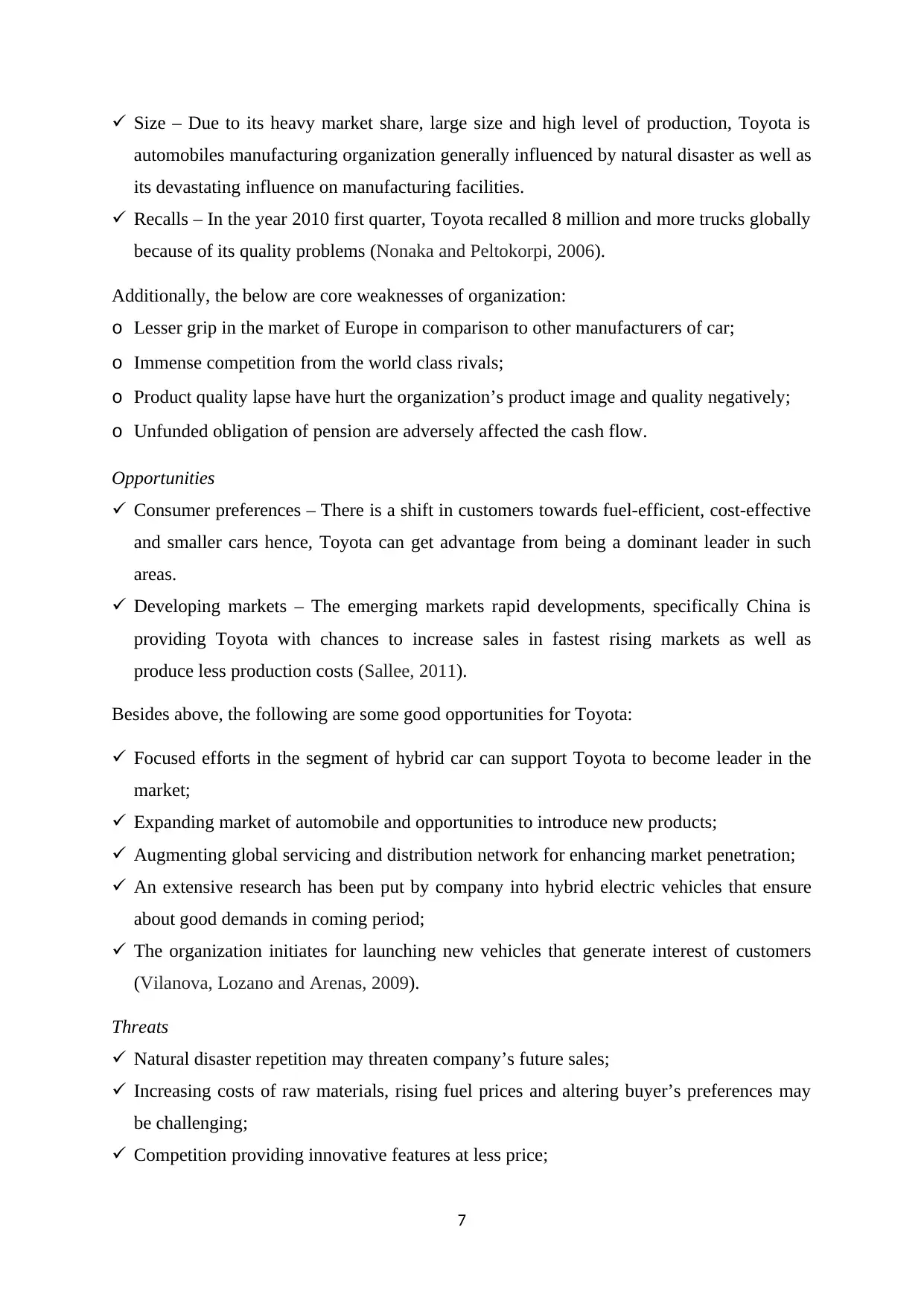
Size – Due to its heavy market share, large size and high level of production, Toyota is
automobiles manufacturing organization generally influenced by natural disaster as well as
its devastating influence on manufacturing facilities.
Recalls – In the year 2010 first quarter, Toyota recalled 8 million and more trucks globally
because of its quality problems (Nonaka and Peltokorpi, 2006).
Additionally, the below are core weaknesses of organization:
o Lesser grip in the market of Europe in comparison to other manufacturers of car;
o Immense competition from the world class rivals;
o Product quality lapse have hurt the organization’s product image and quality negatively;
o Unfunded obligation of pension are adversely affected the cash flow.
Opportunities
Consumer preferences – There is a shift in customers towards fuel-efficient, cost-effective
and smaller cars hence, Toyota can get advantage from being a dominant leader in such
areas.
Developing markets – The emerging markets rapid developments, specifically China is
providing Toyota with chances to increase sales in fastest rising markets as well as
produce less production costs (Sallee, 2011).
Besides above, the following are some good opportunities for Toyota:
Focused efforts in the segment of hybrid car can support Toyota to become leader in the
market;
Expanding market of automobile and opportunities to introduce new products;
Augmenting global servicing and distribution network for enhancing market penetration;
An extensive research has been put by company into hybrid electric vehicles that ensure
about good demands in coming period;
The organization initiates for launching new vehicles that generate interest of customers
(Vilanova, Lozano and Arenas, 2009).
Threats
Natural disaster repetition may threaten company’s future sales;
Increasing costs of raw materials, rising fuel prices and altering buyer’s preferences may
be challenging;
Competition providing innovative features at less price;
7
automobiles manufacturing organization generally influenced by natural disaster as well as
its devastating influence on manufacturing facilities.
Recalls – In the year 2010 first quarter, Toyota recalled 8 million and more trucks globally
because of its quality problems (Nonaka and Peltokorpi, 2006).
Additionally, the below are core weaknesses of organization:
o Lesser grip in the market of Europe in comparison to other manufacturers of car;
o Immense competition from the world class rivals;
o Product quality lapse have hurt the organization’s product image and quality negatively;
o Unfunded obligation of pension are adversely affected the cash flow.
Opportunities
Consumer preferences – There is a shift in customers towards fuel-efficient, cost-effective
and smaller cars hence, Toyota can get advantage from being a dominant leader in such
areas.
Developing markets – The emerging markets rapid developments, specifically China is
providing Toyota with chances to increase sales in fastest rising markets as well as
produce less production costs (Sallee, 2011).
Besides above, the following are some good opportunities for Toyota:
Focused efforts in the segment of hybrid car can support Toyota to become leader in the
market;
Expanding market of automobile and opportunities to introduce new products;
Augmenting global servicing and distribution network for enhancing market penetration;
An extensive research has been put by company into hybrid electric vehicles that ensure
about good demands in coming period;
The organization initiates for launching new vehicles that generate interest of customers
(Vilanova, Lozano and Arenas, 2009).
Threats
Natural disaster repetition may threaten company’s future sales;
Increasing costs of raw materials, rising fuel prices and altering buyer’s preferences may
be challenging;
Competition providing innovative features at less price;
7
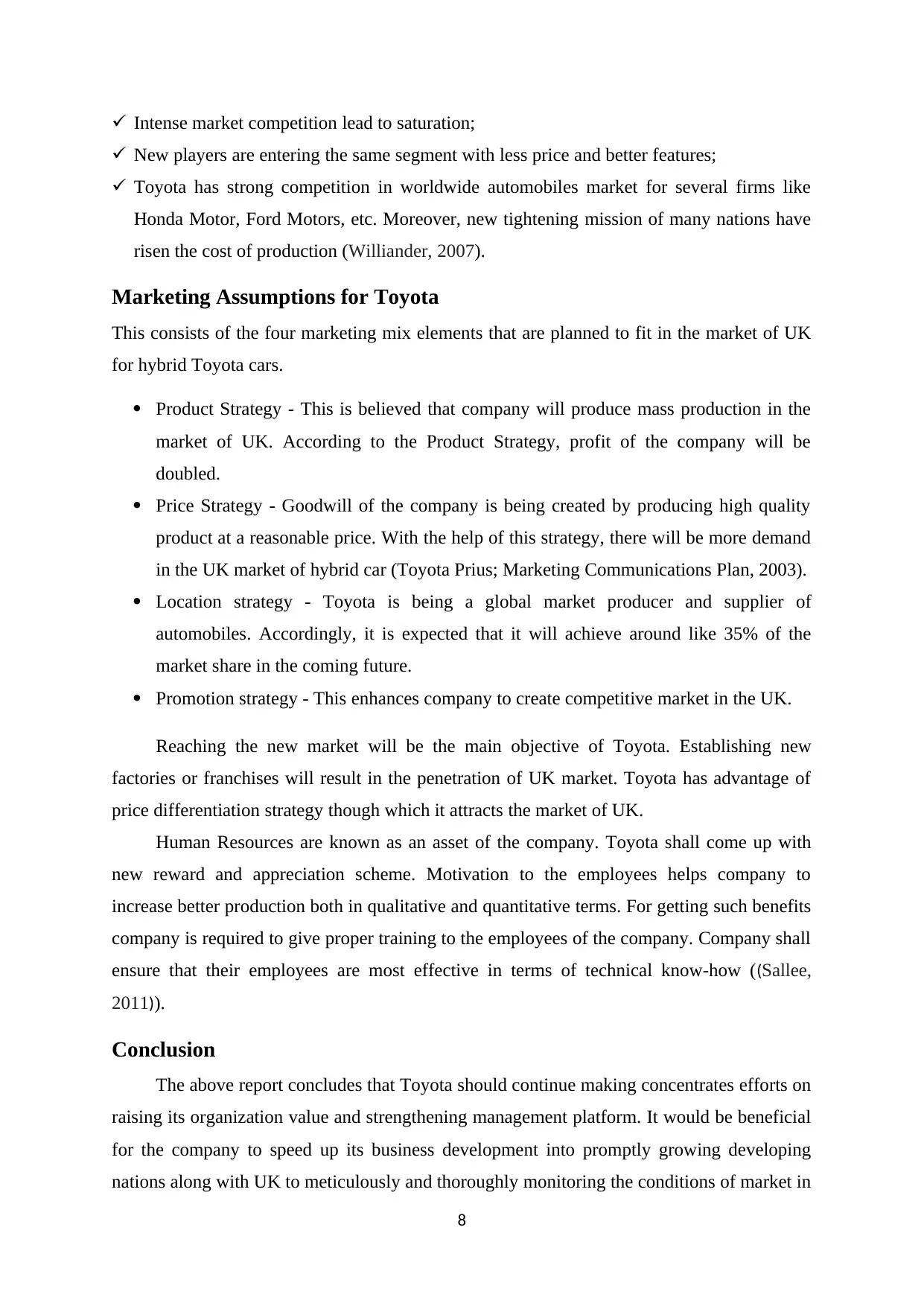
Intense market competition lead to saturation;
New players are entering the same segment with less price and better features;
Toyota has strong competition in worldwide automobiles market for several firms like
Honda Motor, Ford Motors, etc. Moreover, new tightening mission of many nations have
risen the cost of production (Williander, 2007).
Marketing Assumptions for Toyota
This consists of the four marketing mix elements that are planned to fit in the market of UK
for hybrid Toyota cars.
Product Strategy - This is believed that company will produce mass production in the
market of UK. According to the Product Strategy, profit of the company will be
doubled.
Price Strategy - Goodwill of the company is being created by producing high quality
product at a reasonable price. With the help of this strategy, there will be more demand
in the UK market of hybrid car (Toyota Prius; Marketing Communications Plan, 2003).
Location strategy - Toyota is being a global market producer and supplier of
automobiles. Accordingly, it is expected that it will achieve around like 35% of the
market share in the coming future.
Promotion strategy - This enhances company to create competitive market in the UK.
Reaching the new market will be the main objective of Toyota. Establishing new
factories or franchises will result in the penetration of UK market. Toyota has advantage of
price differentiation strategy though which it attracts the market of UK.
Human Resources are known as an asset of the company. Toyota shall come up with
new reward and appreciation scheme. Motivation to the employees helps company to
increase better production both in qualitative and quantitative terms. For getting such benefits
company is required to give proper training to the employees of the company. Company shall
ensure that their employees are most effective in terms of technical know-how ((Sallee,
2011)).
Conclusion
The above report concludes that Toyota should continue making concentrates efforts on
raising its organization value and strengthening management platform. It would be beneficial
for the company to speed up its business development into promptly growing developing
nations along with UK to meticulously and thoroughly monitoring the conditions of market in
8
New players are entering the same segment with less price and better features;
Toyota has strong competition in worldwide automobiles market for several firms like
Honda Motor, Ford Motors, etc. Moreover, new tightening mission of many nations have
risen the cost of production (Williander, 2007).
Marketing Assumptions for Toyota
This consists of the four marketing mix elements that are planned to fit in the market of UK
for hybrid Toyota cars.
Product Strategy - This is believed that company will produce mass production in the
market of UK. According to the Product Strategy, profit of the company will be
doubled.
Price Strategy - Goodwill of the company is being created by producing high quality
product at a reasonable price. With the help of this strategy, there will be more demand
in the UK market of hybrid car (Toyota Prius; Marketing Communications Plan, 2003).
Location strategy - Toyota is being a global market producer and supplier of
automobiles. Accordingly, it is expected that it will achieve around like 35% of the
market share in the coming future.
Promotion strategy - This enhances company to create competitive market in the UK.
Reaching the new market will be the main objective of Toyota. Establishing new
factories or franchises will result in the penetration of UK market. Toyota has advantage of
price differentiation strategy though which it attracts the market of UK.
Human Resources are known as an asset of the company. Toyota shall come up with
new reward and appreciation scheme. Motivation to the employees helps company to
increase better production both in qualitative and quantitative terms. For getting such benefits
company is required to give proper training to the employees of the company. Company shall
ensure that their employees are most effective in terms of technical know-how ((Sallee,
2011)).
Conclusion
The above report concludes that Toyota should continue making concentrates efforts on
raising its organization value and strengthening management platform. It would be beneficial
for the company to speed up its business development into promptly growing developing
nations along with UK to meticulously and thoroughly monitoring the conditions of market in
8
Secure Best Marks with AI Grader
Need help grading? Try our AI Grader for instant feedback on your assignments.
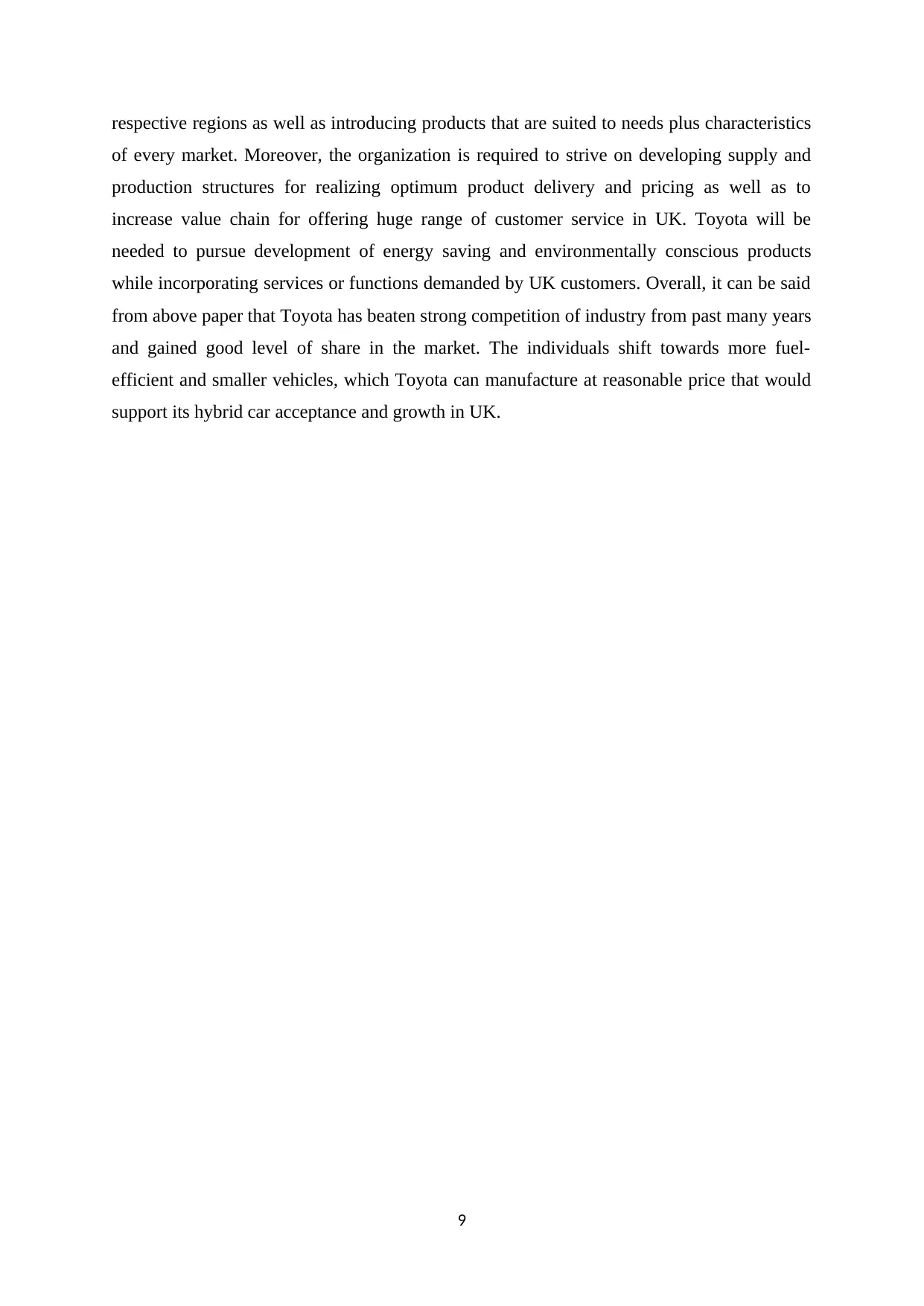
respective regions as well as introducing products that are suited to needs plus characteristics
of every market. Moreover, the organization is required to strive on developing supply and
production structures for realizing optimum product delivery and pricing as well as to
increase value chain for offering huge range of customer service in UK. Toyota will be
needed to pursue development of energy saving and environmentally conscious products
while incorporating services or functions demanded by UK customers. Overall, it can be said
from above paper that Toyota has beaten strong competition of industry from past many years
and gained good level of share in the market. The individuals shift towards more fuel-
efficient and smaller vehicles, which Toyota can manufacture at reasonable price that would
support its hybrid car acceptance and growth in UK.
9
of every market. Moreover, the organization is required to strive on developing supply and
production structures for realizing optimum product delivery and pricing as well as to
increase value chain for offering huge range of customer service in UK. Toyota will be
needed to pursue development of energy saving and environmentally conscious products
while incorporating services or functions demanded by UK customers. Overall, it can be said
from above paper that Toyota has beaten strong competition of industry from past many years
and gained good level of share in the market. The individuals shift towards more fuel-
efficient and smaller vehicles, which Toyota can manufacture at reasonable price that would
support its hybrid car acceptance and growth in UK.
9
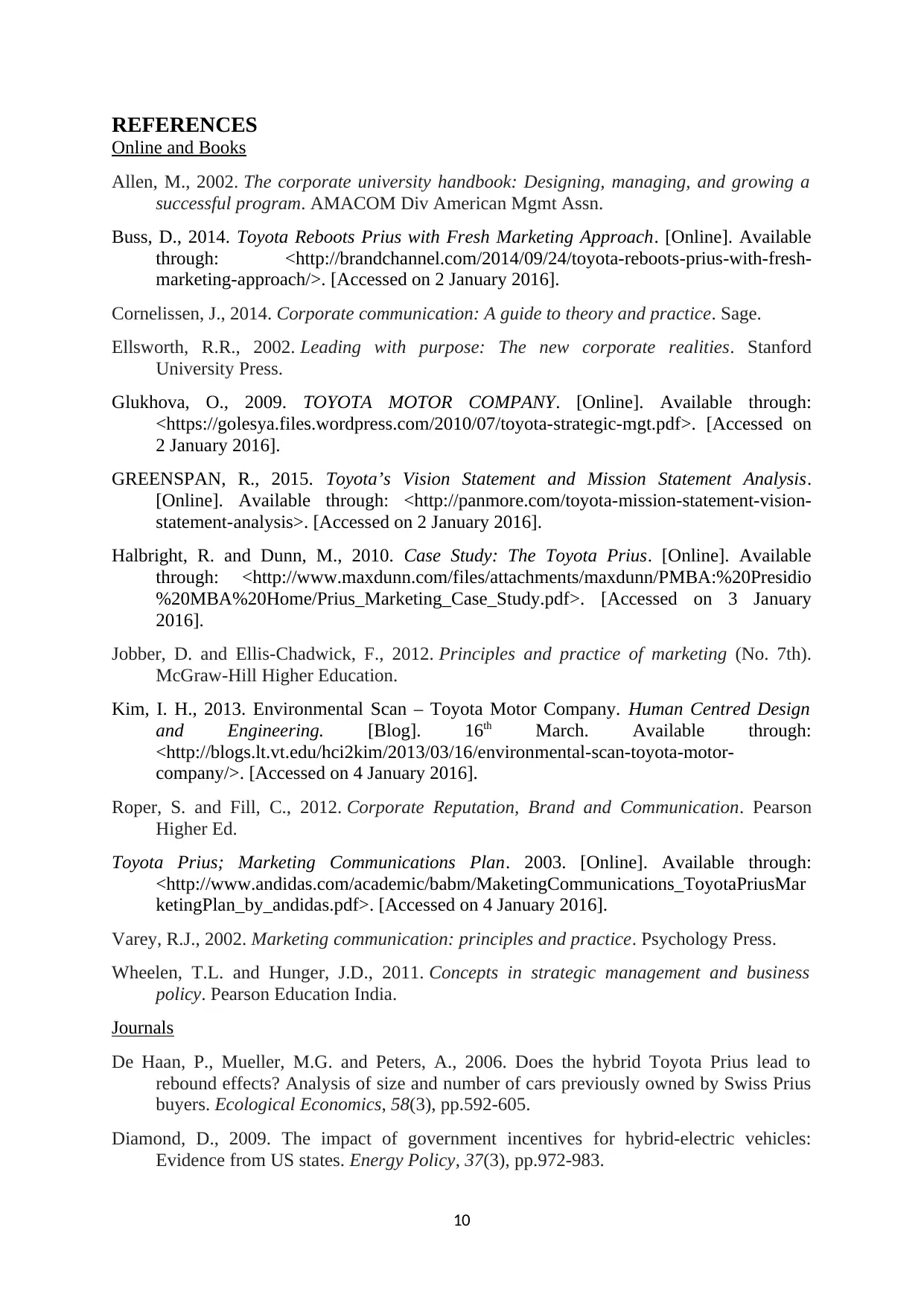
REFERENCES
Online and Books
Allen, M., 2002. The corporate university handbook: Designing, managing, and growing a
successful program. AMACOM Div American Mgmt Assn.
Buss, D., 2014. Toyota Reboots Prius with Fresh Marketing Approach. [Online]. Available
through: <http://brandchannel.com/2014/09/24/toyota-reboots-prius-with-fresh-
marketing-approach/>. [Accessed on 2 January 2016].
Cornelissen, J., 2014. Corporate communication: A guide to theory and practice. Sage.
Ellsworth, R.R., 2002. Leading with purpose: The new corporate realities. Stanford
University Press.
Glukhova, O., 2009. TOYOTA MOTOR COMPANY. [Online]. Available through:
<https://golesya.files.wordpress.com/2010/07/toyota-strategic-mgt.pdf>. [Accessed on
2 January 2016].
GREENSPAN, R., 2015. Toyota’s Vision Statement and Mission Statement Analysis.
[Online]. Available through: <http://panmore.com/toyota-mission-statement-vision-
statement-analysis>. [Accessed on 2 January 2016].
Halbright, R. and Dunn, M., 2010. Case Study: The Toyota Prius. [Online]. Available
through: <http://www.maxdunn.com/files/attachments/maxdunn/PMBA:%20Presidio
%20MBA%20Home/Prius_Marketing_Case_Study.pdf>. [Accessed on 3 January
2016].
Jobber, D. and Ellis-Chadwick, F., 2012. Principles and practice of marketing (No. 7th).
McGraw-Hill Higher Education.
Kim, I. H., 2013. Environmental Scan – Toyota Motor Company. Human Centred Design
and Engineering. [Blog]. 16th March. Available through:
<http://blogs.lt.vt.edu/hci2kim/2013/03/16/environmental-scan-toyota-motor-
company/>. [Accessed on 4 January 2016].
Roper, S. and Fill, C., 2012. Corporate Reputation, Brand and Communication. Pearson
Higher Ed.
Toyota Prius; Marketing Communications Plan. 2003. [Online]. Available through:
<http://www.andidas.com/academic/babm/MaketingCommunications_ToyotaPriusMar
ketingPlan_by_andidas.pdf>. [Accessed on 4 January 2016].
Varey, R.J., 2002. Marketing communication: principles and practice. Psychology Press.
Wheelen, T.L. and Hunger, J.D., 2011. Concepts in strategic management and business
policy. Pearson Education India.
Journals
De Haan, P., Mueller, M.G. and Peters, A., 2006. Does the hybrid Toyota Prius lead to
rebound effects? Analysis of size and number of cars previously owned by Swiss Prius
buyers. Ecological Economics, 58(3), pp.592-605.
Diamond, D., 2009. The impact of government incentives for hybrid-electric vehicles:
Evidence from US states. Energy Policy, 37(3), pp.972-983.
10
Online and Books
Allen, M., 2002. The corporate university handbook: Designing, managing, and growing a
successful program. AMACOM Div American Mgmt Assn.
Buss, D., 2014. Toyota Reboots Prius with Fresh Marketing Approach. [Online]. Available
through: <http://brandchannel.com/2014/09/24/toyota-reboots-prius-with-fresh-
marketing-approach/>. [Accessed on 2 January 2016].
Cornelissen, J., 2014. Corporate communication: A guide to theory and practice. Sage.
Ellsworth, R.R., 2002. Leading with purpose: The new corporate realities. Stanford
University Press.
Glukhova, O., 2009. TOYOTA MOTOR COMPANY. [Online]. Available through:
<https://golesya.files.wordpress.com/2010/07/toyota-strategic-mgt.pdf>. [Accessed on
2 January 2016].
GREENSPAN, R., 2015. Toyota’s Vision Statement and Mission Statement Analysis.
[Online]. Available through: <http://panmore.com/toyota-mission-statement-vision-
statement-analysis>. [Accessed on 2 January 2016].
Halbright, R. and Dunn, M., 2010. Case Study: The Toyota Prius. [Online]. Available
through: <http://www.maxdunn.com/files/attachments/maxdunn/PMBA:%20Presidio
%20MBA%20Home/Prius_Marketing_Case_Study.pdf>. [Accessed on 3 January
2016].
Jobber, D. and Ellis-Chadwick, F., 2012. Principles and practice of marketing (No. 7th).
McGraw-Hill Higher Education.
Kim, I. H., 2013. Environmental Scan – Toyota Motor Company. Human Centred Design
and Engineering. [Blog]. 16th March. Available through:
<http://blogs.lt.vt.edu/hci2kim/2013/03/16/environmental-scan-toyota-motor-
company/>. [Accessed on 4 January 2016].
Roper, S. and Fill, C., 2012. Corporate Reputation, Brand and Communication. Pearson
Higher Ed.
Toyota Prius; Marketing Communications Plan. 2003. [Online]. Available through:
<http://www.andidas.com/academic/babm/MaketingCommunications_ToyotaPriusMar
ketingPlan_by_andidas.pdf>. [Accessed on 4 January 2016].
Varey, R.J., 2002. Marketing communication: principles and practice. Psychology Press.
Wheelen, T.L. and Hunger, J.D., 2011. Concepts in strategic management and business
policy. Pearson Education India.
Journals
De Haan, P., Mueller, M.G. and Peters, A., 2006. Does the hybrid Toyota Prius lead to
rebound effects? Analysis of size and number of cars previously owned by Swiss Prius
buyers. Ecological Economics, 58(3), pp.592-605.
Diamond, D., 2009. The impact of government incentives for hybrid-electric vehicles:
Evidence from US states. Energy Policy, 37(3), pp.972-983.
10
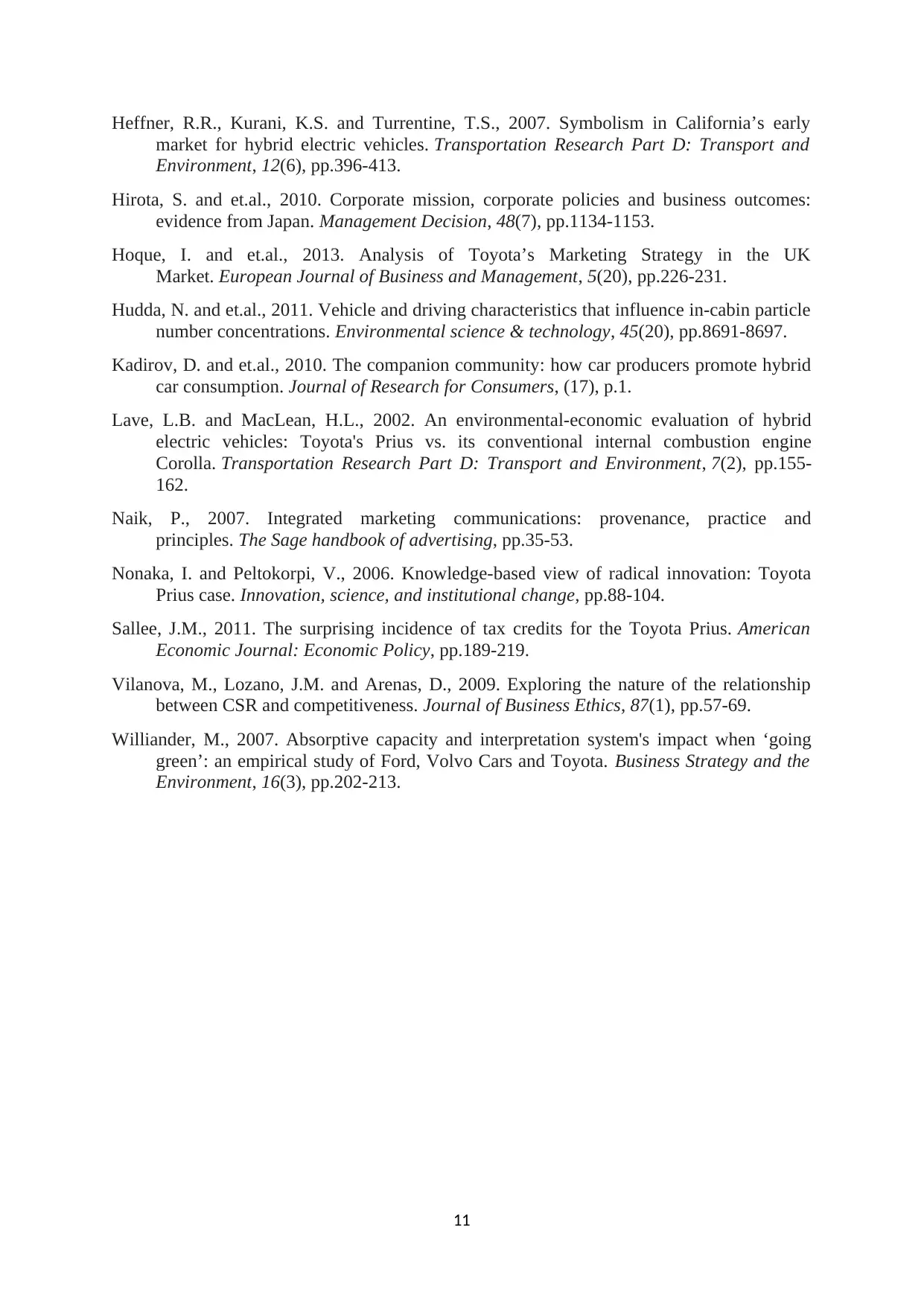
Heffner, R.R., Kurani, K.S. and Turrentine, T.S., 2007. Symbolism in California’s early
market for hybrid electric vehicles. Transportation Research Part D: Transport and
Environment, 12(6), pp.396-413.
Hirota, S. and et.al., 2010. Corporate mission, corporate policies and business outcomes:
evidence from Japan. Management Decision, 48(7), pp.1134-1153.
Hoque, I. and et.al., 2013. Analysis of Toyota’s Marketing Strategy in the UK
Market. European Journal of Business and Management, 5(20), pp.226-231.
Hudda, N. and et.al., 2011. Vehicle and driving characteristics that influence in-cabin particle
number concentrations. Environmental science & technology, 45(20), pp.8691-8697.
Kadirov, D. and et.al., 2010. The companion community: how car producers promote hybrid
car consumption. Journal of Research for Consumers, (17), p.1.
Lave, L.B. and MacLean, H.L., 2002. An environmental-economic evaluation of hybrid
electric vehicles: Toyota's Prius vs. its conventional internal combustion engine
Corolla. Transportation Research Part D: Transport and Environment, 7(2), pp.155-
162.
Naik, P., 2007. Integrated marketing communications: provenance, practice and
principles. The Sage handbook of advertising, pp.35-53.
Nonaka, I. and Peltokorpi, V., 2006. Knowledge-based view of radical innovation: Toyota
Prius case. Innovation, science, and institutional change, pp.88-104.
Sallee, J.M., 2011. The surprising incidence of tax credits for the Toyota Prius. American
Economic Journal: Economic Policy, pp.189-219.
Vilanova, M., Lozano, J.M. and Arenas, D., 2009. Exploring the nature of the relationship
between CSR and competitiveness. Journal of Business Ethics, 87(1), pp.57-69.
Williander, M., 2007. Absorptive capacity and interpretation system's impact when ‘going
green’: an empirical study of Ford, Volvo Cars and Toyota. Business Strategy and the
Environment, 16(3), pp.202-213.
11
market for hybrid electric vehicles. Transportation Research Part D: Transport and
Environment, 12(6), pp.396-413.
Hirota, S. and et.al., 2010. Corporate mission, corporate policies and business outcomes:
evidence from Japan. Management Decision, 48(7), pp.1134-1153.
Hoque, I. and et.al., 2013. Analysis of Toyota’s Marketing Strategy in the UK
Market. European Journal of Business and Management, 5(20), pp.226-231.
Hudda, N. and et.al., 2011. Vehicle and driving characteristics that influence in-cabin particle
number concentrations. Environmental science & technology, 45(20), pp.8691-8697.
Kadirov, D. and et.al., 2010. The companion community: how car producers promote hybrid
car consumption. Journal of Research for Consumers, (17), p.1.
Lave, L.B. and MacLean, H.L., 2002. An environmental-economic evaluation of hybrid
electric vehicles: Toyota's Prius vs. its conventional internal combustion engine
Corolla. Transportation Research Part D: Transport and Environment, 7(2), pp.155-
162.
Naik, P., 2007. Integrated marketing communications: provenance, practice and
principles. The Sage handbook of advertising, pp.35-53.
Nonaka, I. and Peltokorpi, V., 2006. Knowledge-based view of radical innovation: Toyota
Prius case. Innovation, science, and institutional change, pp.88-104.
Sallee, J.M., 2011. The surprising incidence of tax credits for the Toyota Prius. American
Economic Journal: Economic Policy, pp.189-219.
Vilanova, M., Lozano, J.M. and Arenas, D., 2009. Exploring the nature of the relationship
between CSR and competitiveness. Journal of Business Ethics, 87(1), pp.57-69.
Williander, M., 2007. Absorptive capacity and interpretation system's impact when ‘going
green’: an empirical study of Ford, Volvo Cars and Toyota. Business Strategy and the
Environment, 16(3), pp.202-213.
11
1 out of 13
Related Documents
Your All-in-One AI-Powered Toolkit for Academic Success.
+13062052269
info@desklib.com
Available 24*7 on WhatsApp / Email
![[object Object]](/_next/static/media/star-bottom.7253800d.svg)
Unlock your academic potential
© 2024 | Zucol Services PVT LTD | All rights reserved.





